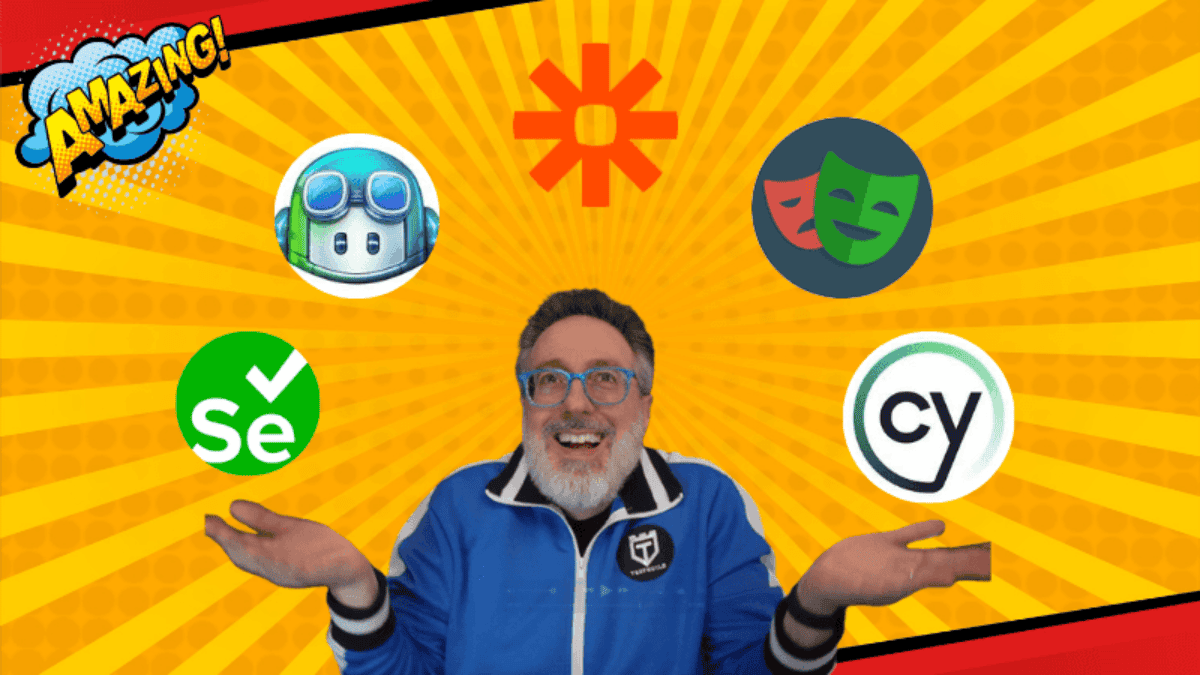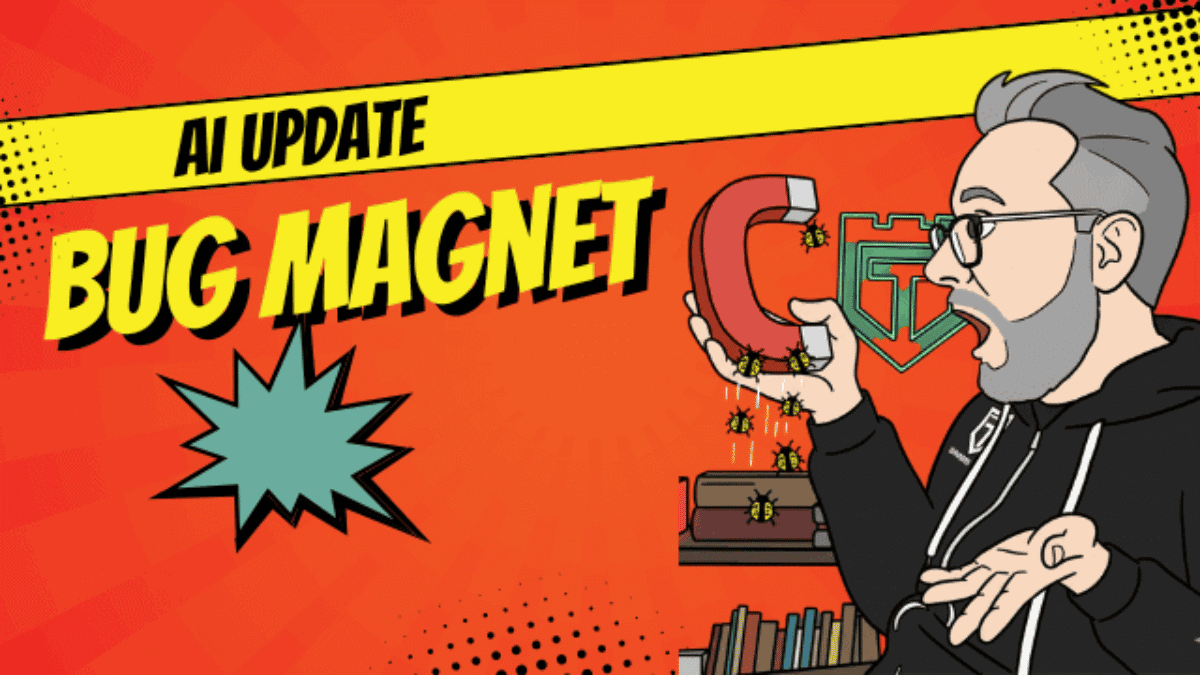What is Model Context Protocol (MCP)
Model Context Protocol (MCP) is an open standard developed by Anthropic which is designed to streamline how AI models interact with external tools, data sources, and services. It provides a unified interface that allows AI agents to securely and efficiently access and integrate various data sources without requiring custom integrations for each one. This standardized protocol is aimed at addressing scalability challenges in AI-powered workflows.
MCP follows a client-server architecture, which means every request to the server can provide context to LLMs in real-time, allowing them to maintain context even across multiple systems. This creates a single protocol for integrating AI models with external data sources and tools like Google Drive, databases, APIs, and more.
But you don't just have to be a developer to appreciate this development.
Why?
MCP For Test Automation
If you are into test automation listen up.
One great example of using MCP in test automation is that MCP enables large language models (LLMs) to interact with web applications using structured accessibility snapshots instead of relying on visual pixels or computer vision techniques.
This approach allows AI models to retrieve semantic context from the DOM, including roles, labels, and states, which mirrors how assistive technologies access content. By doing so, MCP enhances the reliability and explainability of AI-driven interactions with web elements, potentially improving the quality and maintainability of automated tests.
Working with MCP also makes it easier to connect AI assistants to the systems testers already use, from APIs and databases to content repositories and development environments. This kind of mcp integration means you don’t have to create custom logic for every new data source — MCP provides a standardized way to access the data you need.
Want to try it for yourself?
Let’s look at the five most popular ones specific to automation engineers who want to connect AI with different applications and leverage MCP to enhance their workflows.
here are my top 5 MCP for Test Automation
Playwright MCP 
Microsoft has introduced Playwright MCP (Model Context Protocol), a server-side enhancement to its Playwright automation framework designed to facilitate structured browser interactions by Large Language Models (LLMs). Unlike traditional UI automation that relies on screenshots or pixel-based models, Playwright MCP uses the browser’s accessibility tree to provide a deterministic, structured representation of web content.
By enabling LLMs to interact with web pages using structured data instead of visual cues, this protocol improves the reliability and clarity of automated tasks such as navigation, form-filling, and content extraction. It also supports automated test generation, bug reproduction, and accessibility checks directly from natural language inputs.
The tool is lightweight, avoids the ambiguity of visual models, and enhances LLM-driven browser automation without the overhead of computer vision or image interpretation layers.
Cool Use Cases
- Web navigation and form-filling
- Data extraction from structured content
- Automated testing driven by LLMs
- General-purpose browser interaction for agents
![]() 7.3k Stars on GitHub
7.3k Stars on GitHub
Free Automation with Playwright with AI Course
Selenium MCP 
Angie Jones announced on LinkedIn the release of Selenium MCP Server, a new implementation that enables browser automation through the Model Context Protocol (MCP) for Selenium WebDriver.
The tool allows developers and testers to automate browser interactions through standardized MCP clients, supporting both Chrome and Firefox browsers. It demonstrates real-world applications of MCP that bridge traditional testing frameworks with the future of AI integrations.
Cool Use Cases
- Starting browser sessions
- Navigating to URLs
- Finding elements using various locator strategies
- Performing browser interactions like clicking, typing, and screenshots
This implementation connects Selenium with the broader ecosystem of AI applications by allowing integration of AI via MCP. It also reduces the friction of every new data source requiring a new setup—MCP replaces those fragmented approaches.
![]() 85 stars on GitHub
85 stars on GitHub
Join Our Free Private Community
Awesome Kali MCPServers 
Awesome Kali MCPServers is a curated collection of MCP server setups optimized for Kali Linux. Built to support AI agents in tasks like reverse engineering and security assessment, it enables automated workflows with tools for network inspection, target sniffing, traffic monitoring, binary analysis, and more.
Cool Use Cases
- Flexible Network Analysis
- Target Sniffing and Traffic Analysis
- Binary Understanding
- Automation Capabilities
These servers are great example servers for security-focused automation, and show how MCP helps AI interact with low-level data and tools with clarity.
![]() 99 stars on GitHub
99 stars on GitHub
MCP Appium Gestures
The AppiumTestDistribution team has introduced the mcp-appium-gestures (Model Context Protocol (MCP) server for Appium gestures), aiming to streamline the automation of complex mobile interactions.
Cool Use Cases
By leveraging the W3C Actions API this tool supports a range of gestures including:
- tap
- swipe
- scroll
- pinch/zoom
- long press
- drag-and-drop
It provides ready-to-use code snippets for JavaScript (WebdriverIO) and Java (Appium Java Client), along with comprehensive documentation to facilitate implementation.
This MCP server offers a standardized approach for mobile software testers to implementing intricate mobile gestures in automated tests, enhancing consistency across different devices and platforms.
![]() 19 stars on GitHub
19 stars on GitHub
MCP Accessibility Scanner
The MCP Accessibility Scanner integrates AI-powered accessibility testing with Claude Desktop, leveraging Anthropic’s Model Context Protocol (MCP). Developed by Justas Monkevičius, the tool combines Playwright for web automation and Axe-core for accessibility compliance testing.
By utilizing MCP, the scanner enhances AI-assisted accessibility analysis, providing automated insights that streamline testing workflows. This tool is a prime example of how the integration of AI with structured external systems can improve testing efficiency and compliance.
Cool Use Cases
- Comprehensive WCAG Compliance Checks
- Visual Violation Highlights
- Detailed JSON Reports
It showcases how MCP makes AI more actionable and targeted for testers working in accessibility. MCP allows the scanner to fetch relevant DOM and visual data to provide context to LLMs for accurate results.
![]() 3 stars on GitHub
3 stars on GitHub
MCP Frontend Testing Server
The Frontend Testing MCP Server by StudentOfJS is a specialized tool designed to enhance the efficiency of frontend testing workflows. It offers a suite of features tailored for JavaScript and TypeScript applications, focusing on Jest and Cypress frameworks.
Cool Use Cases
- Code Analysis
- Test Generation
- Test Execution
- React Component Testing
This tool shows how MCP data can flow between models and external tools for testing and feedback loops. It's another demonstration of how MCP changes how we approach frontend testing with AI-driven insights.
![]() 2 star on GitHub
2 star on GitHub
Zapier MCP 
Zapier has introduced the Model Context Protocol (MCP), a tool that enables AI assistants to interact directly with over 7,000 applications and perform more than 30,000 actions without the need for complex API integrations.
Cool Use Cases
- Sending messages
- Managing data
- Scheduling events
- Updating records
Though it’s not open-source, Zapier’s MCP helps AI assistants extend their functionality into thousands of tools like Google Sheets, Trello, and Slack. It's a flexible solution that reduces the overhead of building MCP yourself while still allowing AI models and external data to interact efficiently.
Future Trends: Where Is MCP Headed?
MCP servers are becoming really popular, especially when it comes to driving interfaces that you want to expose to AI. With AI models and external systems needing to share real-time context, MCP acts as the bridge. It’s gaining a lot of traction, and with support from major players like Anthropic, OpenAI, and Amazon, the ecosystem is growing fast.
For example in our TestGuild private community Russell Johnson point out the latest announcement that Vibe coding with GitHub Copilot: Agent mode and MCP support rolling out to all VS Code users.
Whether you're building MCP tools yourself or looking for example servers to learn from, the key takeaway is this: MCP to enhance your automation workflows isn’t just a nice-to-have—it’s where the future is headed.
MCP addresses the growing need to maintain context across multiple apps, tools, and environments. It supports standardized AI integrations and makes it easier to retrieve data, fetch from content repositories, and connect to APIs or databases—all through one open protocol.
MCP provides the components of the Model Context you need to build smarter automation. As more tools adopt the MCP specification, expect to see even more robust use cases for MCP across industries.
So make sure to bookmark this page—it will be updated often with every new data source, tool, or development that makes MCP even more powerful for automation engineers.





